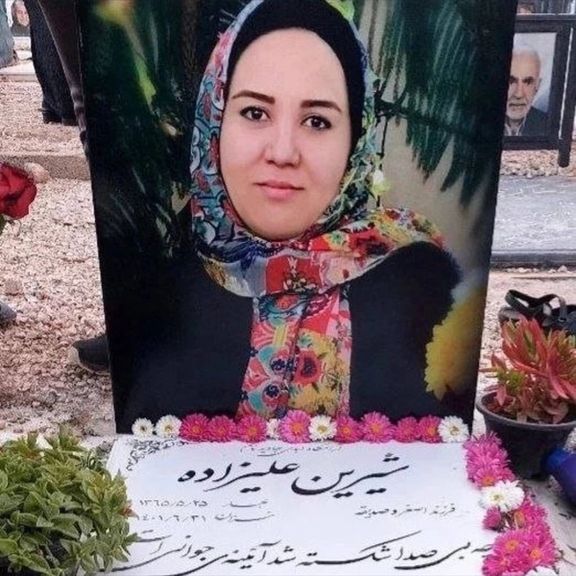Iran Continues To Harass Victim Families Ahead Of Protests Anniv.

Amid an intense intimidation ahead of the anniversary of Women, Life, Freedom protests, the Iranian regime has arrested several more relatives of government victims.

Amid an intense intimidation ahead of the anniversary of Women, Life, Freedom protests, the Iranian regime has arrested several more relatives of government victims.
The regime’s efforts to discourage potential resurgence of street protests have continued in the past few days with detentions of family members of Shirin Alizadeh, Mohammad Javad Zahedi, and Esmail Barahouei, who were killed by government forces, as well as Mohammad-Mehdi Karami, who was executed on trumped up charges.
Mashallah Karami, the father of Mohammad-Mehdi, was arrested Tuesday after security agents stormed the family’s home and took electronic devices such as laptops and mobile phones with them.
Mashallah Karami's arrest has triggered widespread reactions, with many Iranians describing it as proof of the regime’s fear of potential unrest on the anniversary of the uprising.
On Wednesday, regime agents raided Nasrin Alizadeh's home, detained her, and transferred her to an undisclosed location. Last week, security forces arrested Kourosh Vaziri, whose 35-year-old wife Shirin Alizadeh was killed by regime agents while she was filming protests alongside her husband and child in Mazandaran province last September. The moment she was shot and killed was captured and recorded on his mobile phone.

On Wednesday evening, Mahsa Yazdani, the mother of Mohammad Javad Zahedi, was also arrested. Mohammad Javad Zahedi, a 20-year-old from Sari, was wounded by security forces on the night of September 22 and died due to bleeding as emergency services failed to treat him.
Another arrestee was Faramarz Barahouei, the 15-year-old brother of Esmail Barahouei (Abil), who was among those killed on the Bloody Friday in Zahedan. The teenager was arrested by the military in Torbat-e Heydarieh, a city in Khorasan Razavi province 800 kilometers north of Zahedan, where his brother was killed. The crackdown on protesters in Zahedan, the provincial capital of Sistan-Baluchestan, known as the Bloody Friday, took place on September 30,2022, when security forces killed more than 80 people, including women and children.
The regime has escalated its clampdowns on activists, students, educators, and writers in the lead-up to the September 16 anniversary of Mahsa Amini’s death at the hands of police. Families of protesters who died during the uprising as well as civil and human rights activists and students are the main target of the regime’s repression apparatus that wants to silence the most prominent popular voices.
Decrying Iran's campaign of harassment and intimidation, Amnesty International said earlier in the week that the families of those unlawfully killed by Iran’s security forces during the 2022 uprising must be allowed to mark the one-year anniversaries of their deaths. The group also published a new research detailing how the Iranian authorities have been subjecting victims’ families to arbitrary arrest and detention, imposing cruel restrictions on peaceful gatherings at grave sites, and destroying victims’ gravestones. Amnesty International also documented and published images depicting the destruction of graves belonging to more than 20 victims from 17 cities.
Victims’ families have faced reprisals for publicly condemning or lodging official complaints about the unlawful killings of their loved ones by security forces, challenging official narratives about their deaths, calling for accountability, holding gatherings for bereaved families, and writing social media posts deemed critical of the authorities, Amnesty added.
Alan Tofighi, a Paris-based physician and activist, told Iran International that the recent arrests and harassments underscore the regime's apprehension regarding potential renewed protests, to the extent that it even fears the memory of protesters buried in graves. Earlier this week, authorities announced that the family of Mahsa Amini cannot set up a pop-up canopy over her grave, citing the possibility of gatherings as the reason.
Dozens of the victims’ families and protesters who were detained and released during the nationwide rallies in the past year have been arrested or summoned, with reports coming from several provinces, including Tehran, Gilan, Kordestan, West Azarbaijan, and Esfahan (Isfahan).
Those summoned by the intelligence agencies have been asked to sign pledges to stay at home for a week, and some have even been required to take time off from work, ensuring their absence from any protests. They have been threatened with arrest if they are found engaged in any pro-protest movement activities in public or on social media.
So far, seven protesters have been executed, and several others face execution. Hardliner cleric and member of the Iranian Assembly of Experts Ahmad Khatami also issued a stern threat against any future protesters, saying that they would be met with forceful suppression, as if the current rounds of suppression are not forceful.